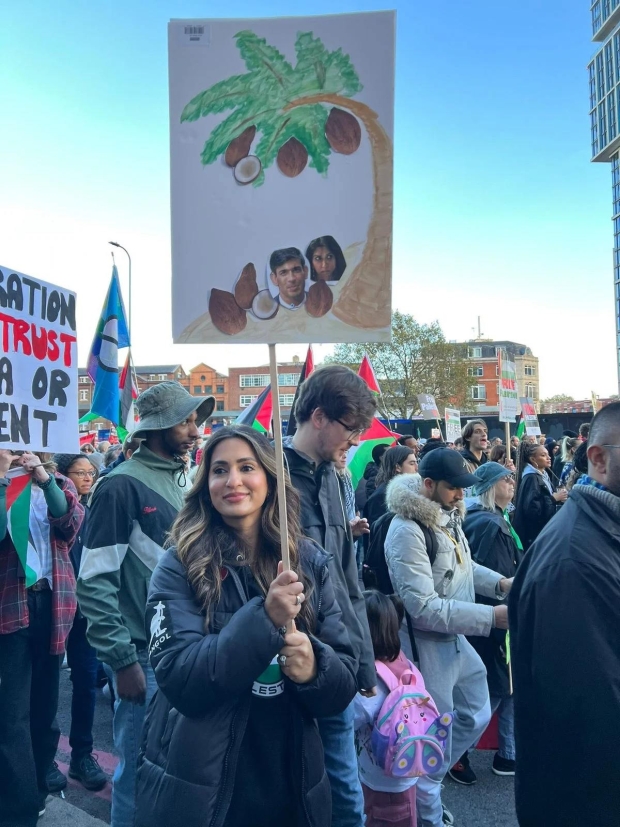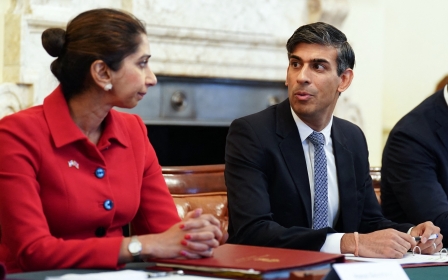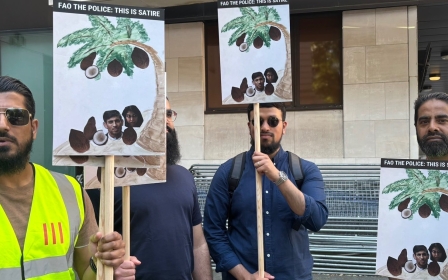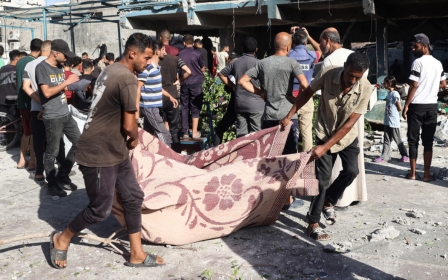'Coconuts' trial: Woman acquitted over Palestine protest placard
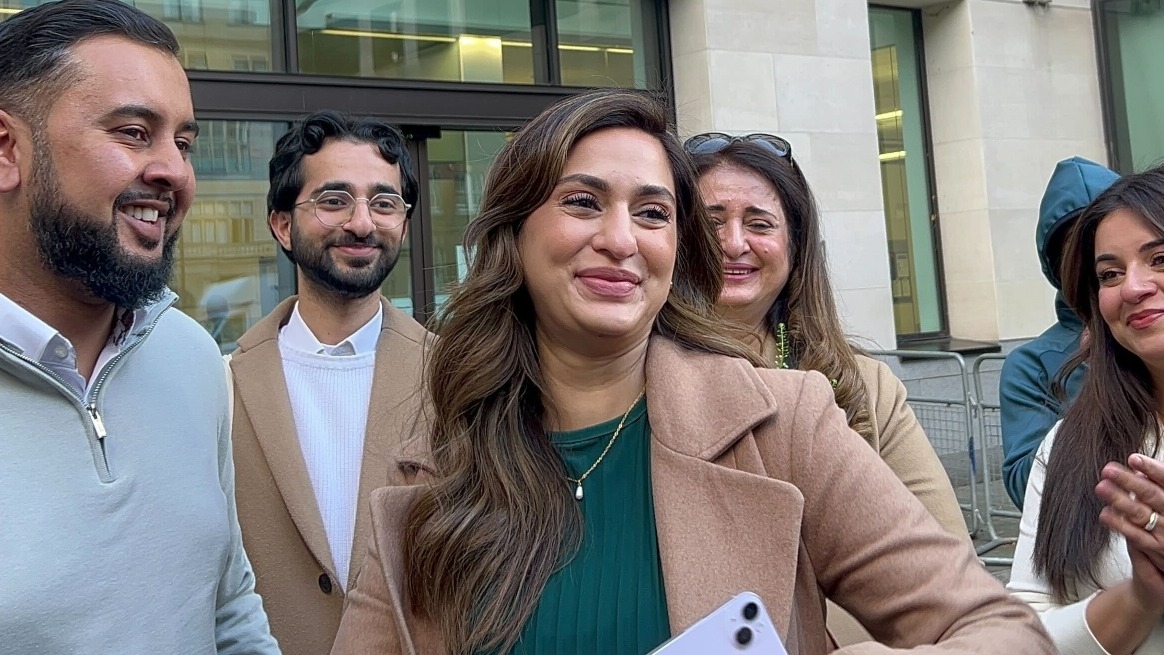
A court has found a woman not guilty of a racially aggravated public order offence for holding a placard depicting politicians Rishi Sunak and Suella Braverman as “coconuts” during a pro-Palestine march in central London.
Marieha Hussain was arrested and charged after being photographed holding the placard depicting the former prime minister and home secretary, who are both British Asians, at a protest against the war in Gaza in November.
Speaking in front of Westminster Magistrates Court, Hussain, who is nine months pregnant and a mother of two young children, thanked her family, supporters, including CAGE UK, and lawyers for supporting her over the last ten months.
"Despite the pressure from the CPS and Police, Judge Vanessa Lloyd has seen through this politicised prosecution and I have found justice today," said Hussain.
"The damage done to my reputation and image can never be undone and I am proud to have defended the principle that our language and political critique is not illegal.
New MEE newsletter: Jerusalem Dispatch
Sign up to get the latest insights and analysis on Israel-Palestine, alongside Turkey Unpacked and other MEE newsletters
"The laws of hate speech must serve to protect us all but this trial showed how these laws are weaponised to target ethnic minorities and in my case to crackdown on pro-Palestine political activism.
"It goes without saying that this ordeal has been agonising for my family and I. Instead of enjoying my pregnancy, I have been vilified in the media, lost my career and dragged through the court system in what can only be described as a politically motivated show-trial.
"Although it may seem like I lost it all, in fact I have been liberated. Free to openly call out genocide-enablers wherever I find them. Nearly a year on from the genocide in Gaza, and despite this trial, I am more determined than ever to continue using my voice to defend Palestine."
Following the two-day trial, District Judge Vanessa Lloyd said Hussain's placard was "part of the genre of political satire".
"As such, the prosecution have not proved to the criminal standard that it was abusive," Lloyd said in her judgement.
"The prosecution has also not proved to the criminal standard that you were aware that your placard may be abusive."
On Friday morning, Hussain told the court that the placard she was holding was not “meant to be offensive” but an example of political commentary and “satirical".
“There was no hate speech. It was a satirical placard. It was funny. It was comic. There were no words on it in reference to ‘speech’. I did not alter the images of the home secretary and prime minister,” Hussain told the court.
“[Calling the placard] hate-speech is far-fetched in my opinion.”
During cross-examination, Hussain told the court she attended the demonstration with her husband, six-year-old child, sister-in-law, and child, with family members exchanging homemade placards they made before the protest.
Among the placards Hussain’s family brought to the protest include a double-sided sign that had the coconuts sign on one side another calling Braverman, “Cruella Braverman”.
Her family contingent also had a sign saying: “My generation will never trust the media or the government.”
“I was trying to highlight the policies and rhetoric used by Suella Braverman was saying at doing at the time, was racist, which was supported by the Prime Minister,” Hussain said when explaining the messaging behind her placard.
Hussain also told the court that a man had requested a picture of her placard during the protest and that no police officer had stopped to question her on the “coconuts” placard.
“Towards the end of the march, the children were getting a bit tired and we pulled to the side to stop and give the kids some snacks.
"I was happening to hold the placard. Somebody called out asking if they can take a picture of my placard,” said Hussain.
“A male voice called out. The placard showed the Cruella Braverman side, and the man asked to show the other side which showed the coconuts sign.”
'Hiding in the shadows'
In closing remarks, Hussain’s lawyer, Rajiv Menon, said the person who posted the picture was “conveniently hiding in the shadows that had apparently taken offence. We wouldn’t be here today. Thousands of officers were wholly uninterested [in Hussain’s] placard."
The court heard on Thursday that police had been alerted to Hussain's banner by a tweet posted by Harry's Place, described by Menon as "a secretive political blog... that has a particular interest in opposing any criticism of the Israeli state".
Speaking on Friday, Menon also questioned why prosecutors had not brought forward any witnesses of their own to comment on why they believed the phrase "coconut" was a racial slur.
"The only qualified expert the police could find in 10 months of searching was Professor Kehinde Andrews. And he told them that coconut was not racist. And he additionally told the police to share his advice with the CPS so they could stop wasting everyone's time.
“Why has [the prosecution] not called somebody who was offended?”
Menon added: "That Marieha Hussain of all people is being prosecuted for a racially aggravated offence whilst the likes of Suella Braverman and Nigel Farage and Stephen Yaxley-Lennon - aka Tommy Robinson - and Frank Hester are seemingly free to make inflammatory and divisive statements ... is, I'm afraid, incomprehensible to many people."
During the second day of proceedings, the court heard testimony from expert witnesses put forward by the defence, including Professor Gus John, Professor Gargi Bhattacharyya, and Middle East Eye columnist Peter Oborne.
Middle East Eye delivers independent and unrivalled coverage and analysis of the Middle East, North Africa and beyond. To learn more about republishing this content and the associated fees, please fill out this form. More about MEE can be found here.


